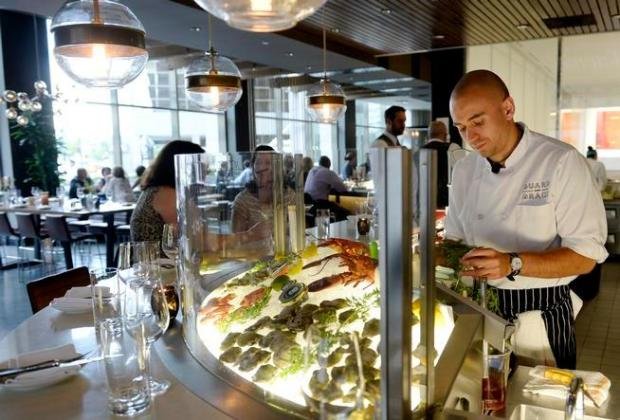
A few weeks ago, some of Colorado’s most famous restaurants lamented the difficult economic and regulatory barriers to operating their businesses. Notable changes are around respected restaurateurs like Juan Padro, Alex Seidel, Jen Jasinski, Beth Gruitch, Dana Rodriguez and Tommy Lee who all told The Colorado Sun they are looking for greener pastures to operate their businesses.
More importantly, Troy Guard announced last week that he and his wife will move to Houston because growing his business in Colorado has become too difficult and expensive. He certainly does not go for the weather. The Merciful Watchman at 1801 California Street will remain open, and his business will still be headquartered here, but future expansion will be in Texas.
The restaurant business is tough, to say the least. Margins for well-run owner-operated restaurants are less than 10%. As the owner of Sage Hospitality, which operates 50 restaurants, bars, coffee shops and entertainment venues across America, including 20 in Colorado, I can tell you that our network here is about as low as it gets. about 20% in the last ten years.
Restaurants, along with retail, arts, entertainment and sports groups create great jobs and provide significant tax revenue to our cities and state. These businesses make the fabric of our community beautiful and attractive.
The vibrant world-class city has a thriving small business sector that reflects the unique local characteristics of the community. Together they are the special sauce that ultimately attracts employers and visitors, generating tax dollars that keep our state economically healthy.
However, over the past decade, local and state elected officials have made operating a small business in Denver more difficult. Well-intentioned laws have created a hostile economic environment for small businesses to thrive.
For example, the new 2021 law – Energize Denver – will cost the owners of Denver’s major properties – restaurants, hotels, real estate and apartment buildings – tens of thousands of dollars in compliance each year, all in effort to minimize. greenhouse gases from Denver’s older buildings. The Denver City Council should at least reform Energize Denver to make its operation more efficient and economical in a way that doesn’t hurt small businesses.
That same year, the government moved forward with House Bill 1286 that requires businesses to audit the energy efficiency of any large buildings to meet the goal of reducing greenhouse gas emissions. The Colorado Department of Public Health and Environment implemented new performance standards through Act Number 28.
Meanwhile, the minimum wage is approaching $19 an hour in Denver, and employers are now required to fund a paid family leave program, splitting roughly 1% of taxes with workers.
And business property taxes are rising with property prices reaching record highs across the country just in time for the two-year trial period. Even with the government’s efforts to reduce property taxes, businesses are still suffering. Our audited values have increased by almost 40% in the last few years. Our state legislature should use the next special session to reach a balanced deal that protects K-12, higher education, and health care while making our nation available for homeowners and small businesses.
These state and local laws make Colorado uncompetitive. It’s time for state and local elected officials to take notice of how these policies negatively impact small businesses while leaving many of our citizens unable to afford food.
A few weeks ago, the money management firm TIAA announced the elimination of 1,000 jobs in Denver, moving them to Frisco, Texas, and breaking the city’s lease two years early. Another sign that Colorado is becoming a less attractive place for companies to do business.
I moved to Denver in 1984 to start a business. Denver was facing one of the worst times in the city’s economy, the economy is heavily dependent on the oil and gas industry. When the price of oil went down, we faced serious problems. There was massive migration, office vacancies approached 40%, and in 1987 unemployment was 9.1%.

The numbers were alarming, but the Coloradoans came together to turn the tide. Governor Roy Romer, Mayor Federico Peña, and many community and business leaders joined forces to create change. There was a bold vision of what was possible, and change happened. Our economy boomed and we prospered for almost three decades.
A recent CNBC survey ranked Colorado 23rd for quality of life, 39th for cost of doing business, 32nd for business friendliness, and 46th for cost of living. The benefits that reflect our country’s low ranking in these categories were unthinkable a decade ago. If those data points aren’t enough to wake up our elected and public leaders, perhaps the departure and closure of the small businesses that make the fabric of our nation special will be the call.
Today we have a choice. We can either continue down the path of regulation and rigid rules or learn from our mistakes and take action to get back on track. I am optimistic and believe that if we come together, we can make positive changes that will once again make Colorado a great place to work, live and play.
Walter Isenberg is CEO and Co-Founder of Sage Hospitality Group. Sage, which celebrated 40 years in business this year, is headquartered in downtown Denver, employs more than 2,000 people in Colorado, and more than 6,000 nationwide.
Subscribe to Sound Off to get a weekly summary of our columns, editorials and more.
To send a letter to the editor about this article, submit online or see our email or email submission guidelines.
Originally published:
#Walter #Isenberg #Restaurant #customers #leaving #Colorado #aggressive #economic #climate